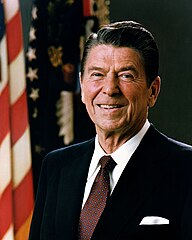Who can disagree with that tautological insight? You are accountable for your own actions unless you incorporate yourself and then it'd depend on your political allies. But wait, whose idea was Reagan denouncing? I scoured the same Internet high and low, but cannot find anyone actually promoting the opposing idea. Who was it that Reagan was rejecting? Did anyone say "every time a law's broken, society is guilty rather than the lawbreaker"? Was the idea then, a straw man?We must reject the idea that every time a law’s broken, society is guilty rather than the lawbreaker. It is time to restore the American precept that each individual is accountable for his actions. - Reagan, testimony to the Republican Platform Committee 1968.
Accountability first and last.
No. Irate readers will do well to miss that "no" and have a fit. It appears likely that Reagan was referring to the growing trend of rehabilitory justice that was in vogue than its retributive form in those turbulent times. Student protests against the Vietnam war, race riots, opposition (political and violent) to police excesses were all seen as blaming society for the sins of the miscreants. Yet, it was hard to find any sizable bloc sympathizing with the criminal actions even if they sympathized with the causes themselves. Reagan was shrewd in that he blurred the lines enough that it was convenient to co-opt peaceful protests into all forms of, and including violent ones. Not for nothing was he called the great communicator. He was the pioneer when it came to dog whistles—Lee Atwater's muse, so to speak.
But fine, suppose we stipulate that Reagan was justified in making that observation. What was his remedy for police excesses like the ones that was responsible for the genesis of the Black Panthers? What did he do when the Black Panthers, in accordance with the Second Amendment and prevailing California laws, took to arming themselves with guns and descending upon the Capitol? Carrying guns openly was legal in California, so the Black Panthers had done no wrong. They simply had announced their intentions that excesses by the police would be met by force.
What did Reagan do? Did he accept accountability for the law enforcement officers and seek to rectify the harassment of blacks? No. Instead, he did exactly what he advocated against, and punished society. He endorsed and signed into law the Mulford Act which was, ahem, a Republican-led measure for gun control in California. Today, the Republicans go apoplectic when someone suggests anything resembling gun control because society needs to be protected from the unconstitutional gun-grabs of liberal politicians.
Yet they develop Reagan-like amnesia when asked to weigh in on what Reagan did. The one who saw
“no reason why on the street today a citizen should be carrying loaded weapons.” He called guns a “ridiculous way to solve problems that have to be solved among people of good will.” In a later press conference, Reagan said he didn’t “know of any sportsman who leaves his home with a gun to go out into the field to hunt or for target shooting who carries that gun loaded.” The Mulford Act, he said, “would work no hardship on the honest citizen.”A modern day Republican should probably weigh in on whether abridging the Second Amendment in the slightest is punishing society for the acts of criminals, and then reconcile Reagan's role in the Mulford Act with the purported principles enshrined in the Constitution.
Fast forward to his presidency. Over the last couple of years, the poutrage over Benghazi reached a deafening volume because four Americans were killed in a terrorist attack on the US embassy in Libya. The cries for accountability reverberated through the 2012 elections and have continued sporadically since. Perhaps a lesson could be learned from two separate international incidents in the Gipper's accountability portfolio. The first was the Beirut marine barracks bombings in 1983 during which 241 servicemen were killed. The second was the illegal sale of arms to Iran and the subsequent illegal funding of the Nicaraguan Contras.
So how was Reagan held accountable by either himself or his modern day devotees?
How did Reagan hold those accountable for the marine barracks bombing?
Was he accepting responsibility for his administration's role in the Iran-Contra affair? Sure, some people were indicted and convicted, but they were summarily pardoned by his successor. Reagan did fire Oliver North, but whither accountability for his own role? Did the buck not stop at Reagan's desk, or did it never make it there in the first place?
Finally, an interesting aside on accountability. It is often noted that these days we have 73 valedictorians instead of just one as we used in the "good old days." Society is deemed to have gone too soft failing to distinguish between good and mediocre. "Everyone's a winner" seemingly leads to "all are losers posing to be winners."
The invasion of Grenada was conducted starting 25 October 1983, just a couple of days after the Beirut barracks bombing. Some 7,000 US troops were involved in fighting approximately 2,200 enemy forces. Given their rapid and decisive victory, recognition was showered on those involved.
I'll let Garry Trudeau illustrate Reagan's system of rewarding meritocracy:


No comments:
Post a Comment